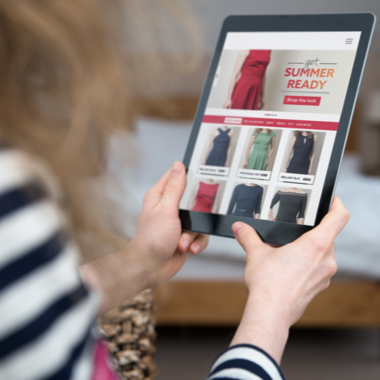
- Five minutes read
Retail trends in Germany: H2 2020
Alternative payment options, more payment by instalments, and responsible handling are just some of the topics that will be important to retailers in the second half of the year.
As we head into the second half of 2020, it is clear that priorities for shoppers in Germany have changed. COVID-19 has had a tremendous impact of consumer payment habits, so what should retailers be focused on to satisfy these needs? Here are five key trends we expect to see in the coming months.
A pull towards alternative payment methods
In many areas of everyday life, the impact of COVID-19 has been an acceleration of the already-existing shift towards a reliance on digital services. Daily video calls with colleagues and friends is one example, and for some e.g. many parents and grandparents, this might be the first time using such technology. Consumers discovering the benefits of being more reliant on contactless cards or mobile wallets and other alternative payment methods is another example.
These shifts away from the established way of doing things look set to be permanent. So for merchants it is imperative to understand the full range of payment options consumers are looking for, and to integrate them where appropriate.
In general, German consumers are demanding more choice; as a recent study by Paysafe shows 47 percent of German customers consider shops that offer several payment options to be more customer-friendly and 42 percent to be more modern.
The concept of self-checkout at supermarkets, with which some customers in Germany are still unfamiliar, is another extension of this trend we should expect to see in the future. And this concept has many advantages for consumers and businesses: shorter queues at the checkout, only the customer touches the goods, and retailers can assign their staff to other tasks such as customer advice instead of processing the checkout. In the coming months, there will definitely be a lot of movement in the area of innovative payment solutions.
More customers are using instalment and invoice payment
Germans generally like to take advantage of offers for later payment options, and in the current situation, invoice and instalment purchases are being used even more frequently. One example of this is grocery shopping; more consumers are shopping online for groceries to be delivered in order to avoid shopping at physical stores during COVID-19, but do not want to pay until the goods are delivered. Paying by invoice on delivery is the appropriate solution.
According to the latest Paysafe study conducted during COVID-19, 32 percent of Germans paid by invoice for online purchases in the previous month. Among Austrian customers, this figure is even higher at 39 percent. To contrast, according to Paysafe data this figure was 23 percent of German consumers in 2019.
Retailers can meet these changing payment preferences with appropriate solutions. With the omnichannel solution Paysafe Pay Later, various instalment and invoice purchase options are possible online, in local stores, and for telephone purchases. The application process for payment by instalments is extremely secure and easy to use for both customers and merchants.
A focus on avoiding irresponsible lending and protecting customers
The current situation is also placing financial burdens on many Germans – many employees are still on short-time work, for example. This is why, on the one hand, interest in invoice and instalment purchase is increasing – but on the other, merchants and payment providers must ensure they uphold the most responsible lending practices as well.
Instalment payments should not expose customers to even greater financial burdens than they are already suffering. Instead it should allow them financial independence for purchases. Providers of appropriate payment solutions must therefore ensure that customers only buy products in instalments that they can afford.
Responsible payment by instalments is a top priority for Paysafe Pay Later. Appropriate mechanisms are used to enforce this. In addition, Paysafe Pay Later has also reviewed its underwriting process for lending in light of the changing economic circumstances.
Consumers are currently also unsettled by the increasing number of cases of online fraud: according to the Paysafe study, 37 percent of German customers are more afraid of fraud in online payments than they were a year ago. Here, too, merchants and payment service providers must implement suitable protective mechanisms to protect customers and maintain their trust.
Increased outsourcing of invoicing processes
Many smaller retailers have previously disregarded the notion of enabling consumers to pay by instalment because they believed it was too complicated. And when merchants take care of instalment payment and invoice processing themselves, this is indeed error-prone and time-consuming, and thus robs merchants of the time that they should invest more sensibly in their core business. Now that shops are gradually reopening, retailers are busy implementing physical distance regulations while at the same time trying to boost their sales. Also, many retailers can certainly use the capital tied up in – as yet unpaid – invoices more sensibly at the moment. It is therefore advisable to place payment processing in the hands of external professionals.
The danger here is that the retailer loses control over the buying experience, or the customer is unsettled if they are referred to another provider for online payment. White label solutions are recommended to avoid this uncertainty and the potential purchase cancellations that may result. These can be fully integrated into the merchant's appearance and the merchant retains full control over its brand identity. Paysafe Pay Later is one such white label solution that – unlike comparable solutions – still gives the merchant full control over the customer experience.
More cooperation in the payment industry, for the benefit of customers
The coming months will bring some upheavals in the retail and payment industry. It is therefore particularly important at this time that relevant players in the payment industry cooperate even more closely with one another in order to jointly drive forward necessary innovations and invest in common infrastructure, as well as continued development of common guidelines for responsible lending.
These are more recommendable now in order to focus even greater on supporting customers and to continue to develop innovative and forward-looking products on this basis. After all, the payment industry stands for innovation and customer centricity, and we must all continue to work together on this in the future.




